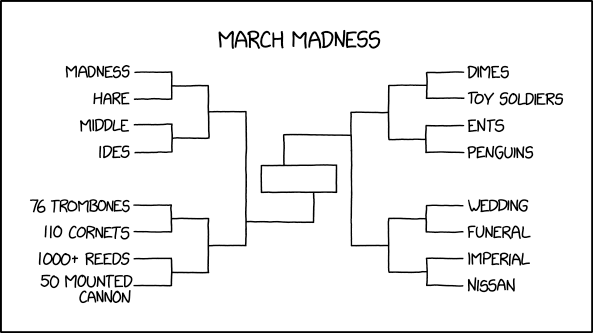March Madness

My bracket has 76 trombones led by John Philip Sousa facing off against thousands of emperor penguins led by Morgan Freeman.

My bracket has 76 trombones led by John Philip Sousa facing off against thousands of emperor penguins led by Morgan Freeman.
Randall has created yet another single-elimination tournament bracket. This time, everything in the bracket relates to the word March.
Upper Left: This section has things that are named after March.
- March Madness is the (trademarked!) colloquial name given to the NCAA Division I men's basketball tournament, the season-culminating college basketball tournament played each spring in the US. It's common for college basketball fans—and even people who pay no attention to the sport for 11 months of the year—to make guesses as to how the tournament will play out by filling out brackets similar to the one shown here. They often compete against each other to see who in a group has the most accurate predictions.
- March Hare refers to the observed chaotic behavior of the European hare said to occur during its breeding season, which peaks in March in Europe. Lewis Carroll comically used the phrase as the name of a 'mad' character in Alice's Adventures in Wonderland as though it referred to a type of hare rather than a seasonal behavior.
- Middlemarch, A Study of Provincial Life is a novel by the English author George Eliot, based around the eponymous (but fictional) central English town. The name was a rather tongue-in-cheek constructed British placename, given that a -march is associated with borderlands (such as the Welsh and Scottish Marches) and yet depicted as being set in the rather unremarkable heartlands of the middle-England of the age.
- Or, more simply, it could just refer to the middle of the month of March, when March Madness takes place, as well as the Ides (see below), in a way that is rather self-referential for this particular branch of the bracket.
- The Ides of March, is the 74th day of the Roman Calendar, corresponding to March 15th, and is notorious for being the date Julius Caesar was assassinated.
Lower Left:
- All entries in this quadrant refer to the song "Seventy-Six Trombones" from the 1957 musical The Music Man. The song describes an imagined parade, particularly the large marching band leading it. ("March" can be a synonym for "parade", in this context.) The opening line of that song states that "76 trombones led the big parade, with 110 cornets close behind." The song also includes the lyrics "there were more than a thousand reeds springing up like weeds" and "there were fifty mounted cannon in the battery".
Upper Right: All entries in this section have the words "march of" in their full names.
- March of Dimes is a charity program advocating for mothers and babies.
- "March of the Toy Soldiers" is a musical piece from Tchaikovsky's The Nutcracker Suite.
- The Last March of the Ents is from the Lord of the Rings: The Two Towers, where the ents, fictional[citation needed] treelike creatures, march against the fortress of Isengard.
- March of the Penguins is a 2005 nature documentary directed by Luc Jacquet. Originally produced in French and available in several translations, the English version has narration by actor Morgan Freeman. It is also mentioned in comic 1408: March of the Penguins.
Lower Right: All entries in this section end with the word "march".
- Wedding March refers to Felix Mendelssohn's musical composition in C Major, as it's the more commonly used name. At the same time it can also be a more general description of a bridal chorus as the bride enters a wedding.
- Funeral March is a musical genre, usually in a minor key, in a slow "simple duple" metre, imitating the solemn pace of a funeral procession. An example of this is the "Funeral March of a Marionette" by Charles Gounod and Lyn Murray, used as the theme for "Alfred Hitchcock Presents."
- "The Imperial March" is a theme from Star Wars which often plays when characters from the Empire, particularly large batches of storm troopers, are on screen.
- The Nissan March is a supermini car produced in Japan.
In the title text, Randall claims his bracket has 76 trombones being led by John Philip Sousa (a famous bandleader and composer who also wrote the national march of the United States; the lead character in The Music Man claims that he led the supposed parade) against the March of the Penguins, led by Morgan Freeman (who narrated the English release of the film).